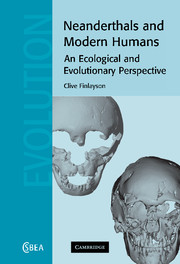Crossref Citations
This Book has been
cited by the following publications. This list is generated based on data provided by Crossref.
Mellars, Paul
2004.
Neanderthals and the modern human colonization of Europe.
Nature,
Vol. 432,
Issue. 7016,
p.
461.
Finlayson, Clive
Fa, Darren A.
Finlayson, Geraldine
Pacheco, Francisco Giles
and
Vidal, Joaquin Rodrı́guez
2004.
Did the moderns kill off the Neanderthals? A reply to F. d’Errico and Sánchez Goñi.
Quaternary Science Reviews,
Vol. 23,
Issue. 9-10,
p.
1205.
2004.
Books Received.
Current Anthropology,
Vol. 45,
Issue. 5,
p.
721.
Mellars, Paul
2005.
The impossible coincidence. A single-species model for the origins of modern human behavior in Europe.
Evolutionary Anthropology: Issues, News, and Reviews,
Vol. 14,
Issue. 1,
p.
12.
Weaver, Timothy D.
and
Steudel-Numbers, Karen
2005.
Does Climate or Mobility Explain the Differences in Body Proportions Between Neandertals and Their Upper Paleolithic Successors?.
Evolutionary Anthropology: Issues, News, and Reviews,
Vol. 14,
Issue. 6,
p.
218.
Finlayson, Clive
Giles Pacheco, Francisco
Rodríguez-Vidal, Joaquín
Fa, Darren A.
María Gutierrez López, José
Santiago Pérez, Antonio
Finlayson, Geraldine
Allue, Ethel
Baena Preysler, Javier
Cáceres, Isabel
Carrión, José S.
Fernández Jalvo, Yolanda
Gleed-Owen, Christopher P.
Jimenez Espejo, Francisco J.
López, Pilar
Antonio López Sáez, José
Antonio Riquelme Cantal, José
Sánchez Marco, Antonio
Giles Guzman, Francisco
Brown, Kimberly
Fuentes, Noemí
Valarino, Claire A.
Villalpando, Antonio
Stringer, Christopher B.
Martinez Ruiz, Francisca
and
Sakamoto, Tatsuhiko
2006.
Late survival of Neanderthals at the southernmost extreme of Europe.
Nature,
Vol. 443,
Issue. 7113,
p.
850.
Kuhn, Steven L.
and
Stiner, Mary C.
2006.
What’s a Mother to Do?.
Current Anthropology,
Vol. 47,
Issue. 6,
p.
953.
Stringer, C. B.
2006.
Neanderthals Revisited: New Approaches and Perspectives.
p.
315.
Elton, Sarah
2006.
Forty years on and still going strong: the use of hominin‐cercopithecid comparisons in palaeoanthropology.
Journal of the Royal Anthropological Institute,
Vol. 12,
Issue. 1,
p.
19.
Delson, Eric
and
Harvati, Katerina
2006.
Return of the last Neanderthal.
Nature,
Vol. 443,
Issue. 7113,
p.
762.
Carrión, J. S.
Scott, L.
Arribas, A.
Fuentes, N.
Gil‐Romera, G.
and
Montoya, E.
2007.
Pleistocene landscapes in central Iberia inferred from pollen analysis of hyena coprolites.
Journal of Quaternary Science,
Vol. 22,
Issue. 2,
p.
191.
Harvati, Katerina
2007.
Handbook of Paleoanthropology.
p.
1717.
Henke, Winfried
2007.
Handbook of Paleoanthropology.
p.
1.
Walker, Robert S.
and
Hamilton, Marcus J.
2008.
Life‐History Consequences of Density Dependence and the Evolution of Human Body Size.
Current Anthropology,
Vol. 49,
Issue. 1,
p.
115.
Elton, Sarah
2008.
The environmental context of human evolutionary history in Eurasia and Africa.
Journal of Anatomy,
Vol. 212,
Issue. 4,
p.
377.
Shipman, Pat
2008.
Separating “us” from “them”: Neanderthal and modern human behavior.
Proceedings of the National Academy of Sciences,
Vol. 105,
Issue. 38,
p.
14241.
Riel-Salvatore, Julien
2009.
Sourcebook of Paleolithic Transitions.
p.
377.
Hovers, Erella
2009.
Sourcebook of Paleolithic Transitions.
p.
455.
Harrold, Francis B.
2009.
Sourcebook of Paleolithic Transitions.
p.
283.
Herrera, Kristian J.
Somarelli, Jason A.
Lowery, Robert K.
and
Herrera, Rene J.
2009.
To what extent did Neanderthals and modern humans interact?.
Biological Reviews,
Vol. 84,
Issue. 2,
p.
245.





